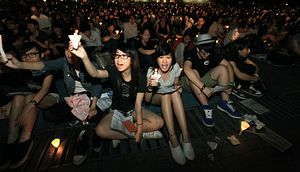A series of controversial arrests of social media activists in Hong Kong since last year’s Occupy Central movement has raised concerns that the government is exploiting the flawed cyberlaw to suppress political speech online in a period of intensifying social and political tensions.
On May 29, Tam Tak-chi, leader of the radical democratic coalition People Power, was arrested for a Facebook post that authorities argued “incited others to commit illegal acts” during road the funeral of Beijing loyalist Yeung Kwong’s body. He was later released on bail and believed the arrest was to warn him not to participate in the June 4 vigil, the Legislative Council’s vote on the political reform package, and the July 1 march.
Two days earlier, Barry Ma, chairman of local pro-independence group Orchid Gardening, was arrested for suggesting on Facebook it was only reasonable to exterminate the entire family of a pro-police columnist. Two months before that, a 27-year-old autonomy group member was arrested for posting a guide on a local website about how to make weapons (e.g., gas bombs) to attack police during the anti-parallel trade protests.
According to a database maintained by Hong Kong Transparency Report, an independent research project under the Journalism and Media Centre, The University of Hong Kong, since June 2014, at least nine activists have been arrested for online remarks. All were charged with under a controversial provision – “access to computer with criminal or dishonest intent” – and three have been sentenced to either community service or rehabilitation center.
The police stated in several official announcements following these arrests that the Internet environment is not a lawless world, and the majority of the laws in the real world are also applicable in the cyber world.
Critics argue the authorities are exploiting the ambiguity of “access to computer with criminal or dishonest intent,” or Section 161 of the Crimes Ordinance, to repress political activists’ speech on the Internet, since Section 161 has a lower standard for prosecution than the more substantial offences such as “illegal gathering,” “criminal intimidation,” or “assaulting police.”
Eric Cheung, principal lecturer and director of clinical legal education at the Law Faculty of The University of Hong Kong, was quoted as saying that if the police believe Barry Ma’s case constituted criminal intimidation, then Ma should be charged with criminal intimidation rather than pursued under Section 161. “Following the police’s logic, if a person expresses the same opinion as Ma’s orally rather than on the Internet, he probably won’t be arrested. That logic simply doesn’t make sense.”
In fact, in the case of Tam Hiu-fung, who was arrested by police for encouraging people to occupy Mong Kok last October on HKGolden, a popular local web forum, Tam was charged under both Section 161 and the “illegal gathering” provision. But the prosecutor dropped the illegal gathering charge in May, and Tam was eventually given 100 hours’ community service under Section 161 only.
The zeal of the police to monitor activists’ online speech is perhaps understandable when we think about the vital role that social media activism played in last year’s Occupy Central movement. Protesters used popular social media platforms such as Facebook, Whatsapp, Twitter, and Instagram to communicate and disseminate real-time information. Joshua Wong, pro-democracy activist and founder of the student activism group Scholarism, emphasized the importance of social media at a recent event: “Without Facebook there would be no Occupy Central, without Facebook there would be no Joshua Wong.”
On June 2, at the Legislative Council’s Panel on Security, legislators debated enthusiastically whether Section 161 has been abused by the government to target political activists’ speech on social media. While pro-establishment legislators proposed to enhance law enforcement to prevent crimes, pan-democrat lawmakers argued for a comprehensive review of Section 161 and the protection of citizens’ rights against unreasonable arrests or prosecution.
In particular, legislator and IT advocate Charles Mok questioned law enforcement’s “double standard” on criminal speech, as seen in a 2010 case, when a netizen claiming to be a former senior police officer sexually threatened pro-democracy student Christina Chan on a local police forum. Authorities elected not to pursue the matter.
“Section 161 exposes the unfair approach taken by the police and they ruined their own integrity and professionalism,” says Craig Choy, legal adviser to local grassroots group Keyboard Frontline.
Undersecretary for Security John Lee told the panel that Section 161 doesn’t target speech but behavior, and he believes the court will ensure that section 161 is not abused. The panel eventually passed the pro-establishment lawmaker’s motion to strengthen the crackdown on cybercrimes.
Activists’ contentious social media remarks have often been deleted immediately following their arrests. The majority of those apprehended have pleaded guilty at the Magistrates court, the lowest-level court in Hong Kong, according to Hong Kong Transparency Report’s database. In Tam’s case, the Magistrate called Tam’s online comment “irresponsible,” and added that it “may encourage readers to take action and generate the sheep flock effect.”
Yet in another case, the defendant, who posted in 2010 on HKGolden threatening to bomb the Liaison Office of the Central People’s Government and was given a year probation for “committing an act outraging public decency,” appealed and had his conviction quashed by the Court of Final Appeal in 2014. The judge commented that “the public element of the offence was not satisfied.”
It is always difficult to draw a distinction between free speech and criminal speech, but the trend of making free speech a crime is a dangerous one. Hong Kong’s law enforcement should permit an independent review of the ongoing arrests of activists on ambiguous charges, simply for what they say on the social media.
Jennifer Zhang is an Internet researcher with Hong Kong Transparency Report, Journalism and Media Studies Centre, The University of Hong Kong.
































